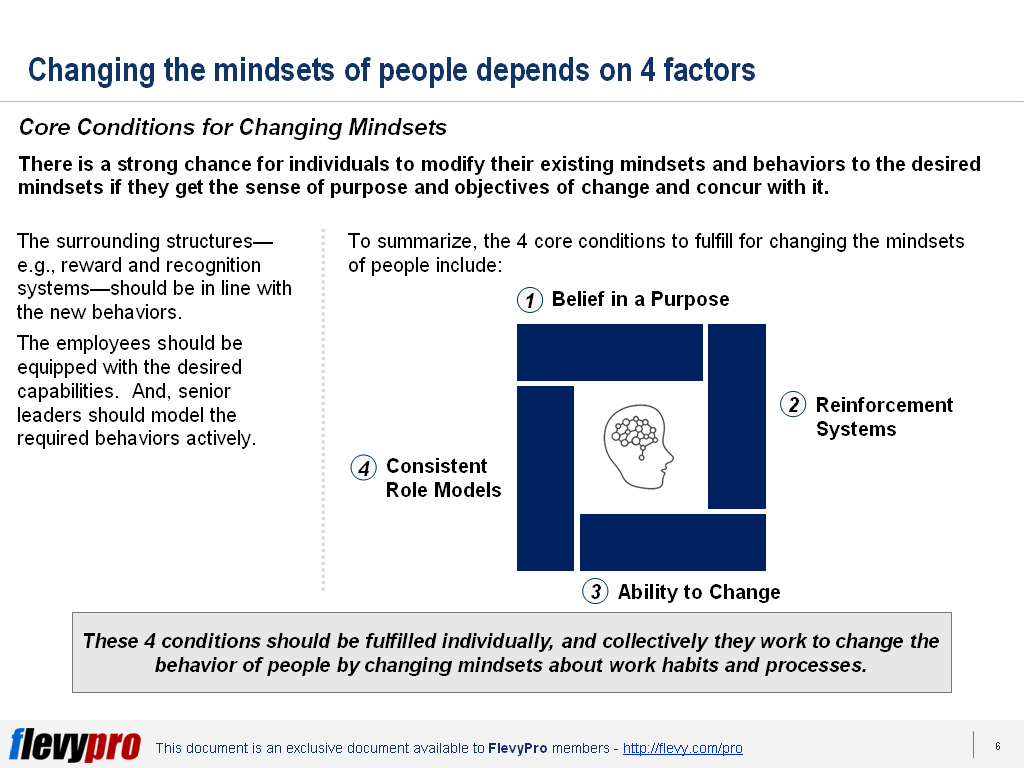 Transformation programs targeted towards boosting organizational performance have been prevalent for quite a while now. But, such initiatives aren’t easy to manage. The foremost challenge for the senior leadership is to motivate people to modify their behaviors and practices.
Transformation programs targeted towards boosting organizational performance have been prevalent for quite a while now. But, such initiatives aren’t easy to manage. The foremost challenge for the senior leadership is to motivate people to modify their behaviors and practices.
For the transformation to be successful, it is critical for the top management to establish the magnitude of change necessary to realize the required business results, before initiating performance improvement projects. They can select from the 3 levels of change. The first level is where firms operate directly to achieve results, without altering the work practices of their people. At the second level, people are compelled to alter their ways in line with their current behaviors in order to achieve a new target. The third level involves a fundamental cultural transformation, changing the mindsets of the whole organization—e.g., from reactive to proactive, strong tiered to forthcoming, inward focused to external focused.
Senior management can get valuable insights from psychology to understand the attitudes, personality types, and thought processes of individuals to improve performance. Utilizing these insights several enterprises have generated amazing, deeply embedded shifts in the mindsets of people. Transformation initiatives that employed psychological developments related to the ways people contemplate and perform are more likely to revolutionize work practices, shift behaviors, and generate improved results.
Change will only be acceptable to employees if they are inspired to think about their responsibilities in a different way. This entails understanding the 4 core conditions of Psychology of Change Management that are essential to alter the existing mindsets of people to the desired mindsets:
- Belief in a Purpose
- Reinforcement Systems
- Ability to Change
- Consistent Role Models

Belief in a Purpose
The first condition to bring about transformation is for the people to have faith in the rationale for change. As per Leon Festinger’s theory of cognitive dissonance, a distressing mental state occurs in individuals when they find that their beliefs are contradicting their actions. Festinger observed that it is necessary to eliminate cognitive dissonance in people by changing either their actions or their beliefs.
It is critical for the people to believe in the overall purpose of the transformation initiatives that the organization has, or is planning to initiate, and understand the part that their jobs can play in the company’s growth. This will lead them to agree to alter their individual behaviors, feel comfortable with the change, and be willing to execute it.
Reinforcement Systems
Psychologists interested in encouraging organizational human resources adopted B. F. Skinner’s theories of conditioning and positive reinforcement. Just as the subjects of Skinner’s experiments were inspired to accomplish the dull task of traversing a maze by providing the right incentives, organizational designers accept that the right incentives and reinforcement systems constructively influence people to do their jobs efficiently.
Reinforcement systems include reporting structures, operational processes, and procedures—setting targets, measuring performance, and presenting rewards. However, these incentives should be in line with the new behaviors that people are required to adopt.
Ability to Change
Change initiatives often tend to urge people to act differently without training them on the ways to adjust broad guidelines as per their specific circumstances. For instance, change initiatives may require people to become “customer-centric,” but if the organization did not focus on customers earlier, the people will have no clue as to how to implement this value and what would entail a successful result in this case.
As substantiated by David Kolb’s four-phase adult learning cycle, to make adults learn they need much more than listening to instructions about a subject in one session; they need time.
Consistent Role Models
Consistent role modeling is as important in changing the behavior of adults as the 3 other core conditions collectively. Individuals, just like children, choose different role models—personalities in positions of influence, such as a partner, director, a union rep—whose behaviors and actions they mimic. Sustainable change in behaviors warrants top management’s full alignment with the new methods of doing business as well as making role models’ backing up their words with action.
The approaches that the role models employ differ from person to person, however, their behaviors should be in accordance with the guiding principles. You can learn more about the 4 core conditions to shifting mindsets alongside some real-life, practical examples here
Transpersonal Psychology Workshops
Simply understanding the rationale for change—its importance for the company—does not influence people to adopt the desired behaviors. It necessitates a profound belief that it will be beneficial for their own development and progression. As corroborated by Transpersonal Psychology, the intrinsic craving to develop and grow instills human beings with energy. Leaders need to create an emotional connection for the employees with the new behavior to prompt that change. Transpersonal psychology workshops are of significant assistance in changing mindsets by creating such emotional connections and assigning change a specific value for individuals.
Interested in learning more about the value that transpersonal psychology workshops generate and how to actually organize them? You can learn more about the Psychology of Change Management and download an editable PowerPoint about here on the Flevy documents marketplace.
Do You Find Value in This Framework?
You can download in-depth presentations on this and hundreds of similar business frameworks from the FlevyPro Library. FlevyPro is trusted and utilized by 1000s of management consultants and corporate executives. Here’s what some have to say:
“My FlevyPro subscription provides me with the most popular frameworks and decks in demand in today’s market. They not only augment my existing consulting and coaching offerings and delivery, but also keep me abreast of the latest trends, inspire new products and service offerings for my practice, and educate me in a fraction of the time and money of other solutions. I strongly recommend FlevyPro to any consultant serious about success.”
– Bill Branson, Founder at Strategic Business Architects
“As a niche strategic consulting firm, Flevy and FlevyPro frameworks and documents are an on-going reference to help us structure our findings and recommendations to our clients as well as improve their clarity, strength, and visual power. For us, it is an invaluable resource to increase our impact and value.”
– David Coloma, Consulting Area Manager at Cynertia Consulting
“As a small business owner, the resource material available from FlevyPro has proven to be invaluable. The ability to search for material on demand based our project events and client requirements was great for me and proved very beneficial to my clients. Importantly, being able to easily edit and tailor the material for specific purposes helped us to make presentations, knowledge sharing, and toolkit development, which formed part of the overall program collateral. While FlevyPro contains resource material that any consultancy, project or delivery firm must have, it is an essential part of a small firm or independent consultant’s toolbox.”
– Michael Duff, Managing Director at Change Strategy (UK)
“FlevyPro has been a brilliant resource for me, as an independent growth consultant, to access a vast knowledge bank of presentations to support my work with clients. In terms of RoI, the value I received from the very first presentation I downloaded paid for my subscription many times over! The quality of the decks available allows me to punch way above my weight – it’s like having the resources of a Big 4 consultancy at your fingertips at a microscopic fraction of the overhead.”
– Roderick Cameron, Founding Partner at SGFE Ltd
“Several times a month, I browse FlevyPro for presentations relevant to the job challenge I have (I am a consultant). When the subject requires it, I explore further and buy from the Flevy Marketplace. On all occasions, I read them, analyze them. I take the most relevant and applicable ideas for my work; and, of course, all this translates to my and my clients’ benefits.”
– Omar Hernán Montes Parra, CEO at Quantum SFE






